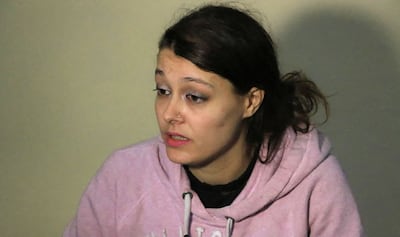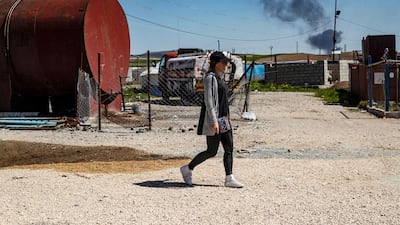In the relative comfort of a prison outside Paris ― after nearly five years in a spartan Kurdish detention camp in north-eastern Syria ― a policeman’s daughter once described as a dangerous terrorist now talks of regaining “the life of a mother and a woman”.
Emilie Konig, now 37 and the mother of five children, three of them born in Syria, was among the 16 French women repatriated to France this week along with their 35 children.
She must now answer for her actions during a Syrian experience that began in 2012 when she turned her back on western society and her middle-class origins to join ISIS.
Prosecutors have charged her with involvement in terrorist conspiracy. She is accused of acting as a key propagandist and recruiter who, adopting the name Ummu Tawwab, called for attacks on French targets, including soldiers’ wives.
Konig insists she has changed. Her lawyer says she is ready to co-operate fully with the authorities and recognises the hurt she has caused.
But Konig has not always been so contrite. She told one interviewer she did not see why she should be jailed, declaring: ”I have no blood on my hands.”

Agnes de Feo, a sociologist and documentary maker who met Konig several times before her departure for Syria, told The National her interviews revealed a “tortured state of mind”.
“I don’t know what she did in Syria,“ she said. “My memory is of a rebellious young woman who was looking for a new life, and who may have been attracted by [ISIS] because she no longer had hope in France. That is not excusing her, just understanding her mind.”
Like many of the young western women drawn to ISIS, Konig was the product of a troubled childhood with no father figure, an abusive relationship and a search for identity. She was a toddler when her father, whom she adored, left her mother.
At school, she was a gifted gymnast until a knee injury forced her to give up. She left school early but had a modest qualification in sales and might have made a respectable career.
She converted to Islam at 17 even though, among many contradictions, she later took a job as a barmaid and fell for a non-practising Algerian man who was jailed for drug offences and subjected her to violence.
Konig bore him two children before escaping from the relationship.
Opposed to a French government law outlawing the face-covering niqab, she actively supported a radical Muslim group, Forsane Alizza (Knights of Pride).
Konig was captured by Kurdish forces in 2017. She had been added to UN and US blacklists as a dangerous terrorist combatant. Her third child was the son of a fighter, who was later killed, but it is not known who fathered her other children, twin girls.
Prof Raphael Liogier, another sociologist who met Konig, told the magazine Paris Match she had more of a profile of an Islamist extremist man.
“What struck me is that she had a more radical, more extreme profile than other women we met,” said Prof Liogier.She was not an ideologue but had a strong desire for revenge."
For her, Islamist extremist figures counted "more than texts, heroic aesthetics prevailed over ideology”, Prof Liogier said.
But how did the “cuddly, sweet kid ... my princess” remembered by her mother, become a cheerleader for terrorism, willing to pose on camera while practising with a shotgun?
“Emilie was abandoned very young by her father,” said Ms de Feo, who has extensively researched the wearing of veils by Muslim women in France.
“She still says she loves him. She was also starved of male company at the time, hurt by destructive relationships with past partners.
“She was beaten by her husband who was imprisoned for drug trafficking. She was a wounded woman. And oddly always looking for a virile man, hence her fascination with the fighters of ISIS.”
Ms de Feo has supplied Konig’s lawyer with footage of her interviews. “For normal people watching TV, they’re going to want her to be judged and to suffer in prison,” she said.
“But for me who knew her personally, I think that the hardships she underwent in her life exculpate her today. I think coercion is a bad solution. She has already paid for what she has done."
In interviews, Konig’s lawyer, Emmanuel Daoud, said she had “an absolute desire to co-operate with French justice and answer all the questions put to her”.
Her main focus, he says, is to be reunited with her children, from whom she is currently separated,
“She will not be in hiding in any way,” Mr Daoud told Le Journal du Dimanche. “She wants to make sure to give herself the means, if she convinces the judges, to resume her normal life in the medium and long term as ‘a woman and a mother’.”


